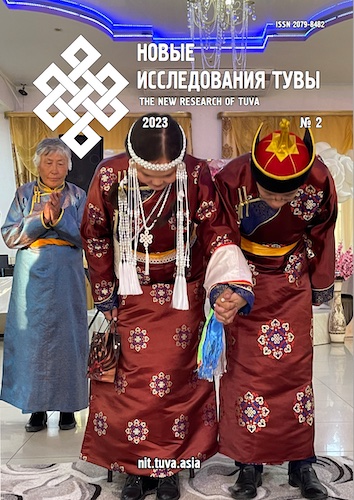Parental labor in the Republic of Tuva in the context of the regional cluster structure of Russia’s demographic space (1990–2019)
DOI:
https://doi.org/10.25178/nit.2023.2.6Keywords:
parental labor; cluster analysis; Russian region; Republic of Tuva; working conditions; work organization; work resultsAbstract
Despite the overall positive dynamics of demographic processes related to the natural reproduction of the population in the Republic of Tuva, the region currently experiences a fairly negative state of several spheres of human capital functioning and development. This may indicate a problematic state of the sphere of parental labor in the region. The article presents the results of identifying the place of the Republic of Tuva in the cluster structures of Russian regions. These structures were formed by the parameters of parental labor during the period from 1990 to 2019. The authors assess the place of the Republic of Tuva in the cluster space of Russian regions according to indicators that demonstrate the conditions, organization and results of parental labor.
The research is based on an interdisciplinary concept of parental labor, which implies the labor character of parenthood and its compliance with all the features of work activity. The sources of the study are the data of the Federal State Statistics Service and the data of federal statistical observations on socio-demographic issues.
Two key features of the position of the Republic of Tuva in the regional cluster structure have been identified. The first one is that Tuva either does not fit into the structure of the formed regional cluster space and is not included in any of the identified clusters, or it is geometrically located at a very far distance from the center of the cluster to which it is assigned. The second feature is that the profile of Tuva as part of the entire cluster is in most cases characterized by polarity and extreme ambiguity.
References
Anayban, Z. V. (2018a) Nravstvennye aspekty tsennostnykh orientatsii sovremennoi regional'noi molodezhi (po materialam etnosotsiologicheskogo issledovaniia v Tuve i Khakasii) [Moral aspects of value orientations of contemporary regional youth (on the materials of ethno-sociological research in the Republic of Khakassia)]. Sayan-Altai Scientific Review, no. 4 (24), pp. 83–89. (In Russ.).
Anaiban, Z. V. (2018b) Trudovaia zaniatost' i sotsial'no-professional'nye orientatsii molodezhi sovremennoi Tuvy [Employment and socio-professional orientations of contemporary Tuva’s youth]. New Research of Tuva, no. 2, pp. 112–131. (In Russ.). DOI: https://doi.org/10.25178/nit.2018.2.6
Anayban, Z. V. and Balakina, G. F. (2022) Sotsial'nye ozhidaniia i tsennostnye orientatsii uchashcheisia molodezhi Tuvy [Social expectations and value orientation of the contemporary students of Tuva]. Sotsiologicheskie issledovaniia, no. 2, pp. 151–156. (In Russ.). DOI: https://doi.org/10.31857/S013216250018548-5
Bagirova, A. P., Bykova, D. G., Voroshilova, A. I., Il'ves, E. V. and Chereshova, S. V. (2017) Roditel'skii trud: ekonomicheskii i sotsiologicheskii analiz [Parental labor: Economic and sociological analysis]. Ekaterinburg, Ural University Publishing House. 208 p. (In Russ.).
Bagirova, A. P., Bykova, D. G., Voroshilova, A. I., Il'ves, E. V. and Shubat, O. M. (2015) Roditel'skii trud: usloviia realizatsii, motivy i rezul'taty [Parental work: Conditions of implementation, motives and results]. Ekaterinburg, Ural University Publishing House. 171 p. (In Russ.).
Bagirova, A. P., Voroshilova, A. I., Il'ves, E. V., Koviazina, I. V., Surina, S. E., Chereshova, S. V. and Shmarova, I. V. (2018) Roditel'skii trud: vozmozhnosti gosudarstvennogo regulirovaniia [Parental labor: Possibilities of state regulation]. Ekaterinburg, Ural University Publishing House. 196 p. (In Russ.).
Bagirova, A. P. and Shubat, O. M. (2021) Modeli praroditel'skogo truda v rossiiskom sotsial'no-ekonomicheskom prostranstve [Models of grandparents’ labour in the socio-economic space of Russia]. Economy of Region, vol. 17, issue 1, pp. 197–208. (In Russ.). DOI: https://doi.org/10.17059/ekon.reg.2021-1-15
Bagirova, A. P., Shubat, O. M., Voroshilova, A. I., Vitik, S. V., Pshenichnikova, M. M. and Polushkina, I. V. (2014) Motivatsiia roditel'skogo truda i regulirovanie ustanovok na roditel'stvo naseleniia Ural'skogo regiona [Motivation of parental labor and regulation of parenting attitudes of the population of the Ural region]. Ekaterinburg, Ural University Publishing House. 271 p. (In Russ.).
Velikaia, E. G. (2013) Reproduktivnyi trud kak instrument rosta natsional'noi ekonomiki [Reproductive labor as a tool for the growth of the national economy]. Natsional'nye interesy: prioritety i bezopasnost', vol. 9, no. 44 (233), pp. 2–10. (In Russ.).
Dorzhu, Z. Yu. and Dash, L. A. (2020) Polozhenie «dulguiak-kadai» v traditsionnoi kul'ture tuvintsev (vtoraia polovina XIX — nachalo XXI v.) [Status of dulguyak-qadai in Tuvan traditional culture: Mid-19th to early 21st centuries]. Oriental Studies, vol. 13, no. 1, pp. 55–63. (In Russ.). DOI: https://doi.org/10.22162/2619-0990-2020-47-1-55-63
Ilyshev, A. M. and Lavrentieva, I. V. (2005) Strategiia vkliucheniia reproduktivnogo truda v ekonomiku Rossii [Strategy for the inclusion of reproductive labor in the Russian economy]. Moscow, Publishing House “Finansy i kredit”. 368 p. (In Russ.).
Klupt, M. A. (2008) Demografiia regionov Zemli [Demographics of the Earth’s regions]. St. Petersburg, Piter. 347 p. (In Russ.).
Kulkova, I. A. (2020) Kak povyshenie pensionnogo vozrasta mozhet povliiat' na rozhdaemost': mnenie ekspertov [How the retirement age increase can affect fertility: Expert opinion]. Gumanitarnye, sotsial'no-ekonomicheskie i obshchestvennye nauki, no. 12–1, pp. 141–145. (In Russ.).
Lamazhaa, Ch. K. (2021) Deti dlia tuvintsev: izmeneniia otnosheniia v sotsiokul’turnykh transformatsiia [Tuvans’ views on children: Changes of the attitudes in socio-cultural transformations]. New Research of Tuva, no. 4, pp. 57–75. (In Russ.). DOI: https://doi.org/10.25178/nit.2021.4.5
Lamazhaa, Ch. K., Valiakhmetov, R. M. and Samba, A. D.-B. (2022) Problemnoe pole issledovanii chelovecheskogo potentsiala Tuvy: obzor literatury i mneniia ekspertov (2020–2021) [The problem field of studying human development in Tuva: A survey of literature and expert opinions (2020–2021)]. New Research of Tuva, no. 2, pp. 6–19. (In Russ.). DOI: https://doi.org/10.25178/nit.2022.2.1
Sinitsa, A. L. (2012) Trud po ukhodu za det'mi doshkol'nogo vozrasta: sochetanie domashnei i obshchestvennoi form [Preschool children care as labor: Combination of home and social forms]. Moscow, MAKS Press. 176 p. (In Russ.).
Sundui, G. D. (2009) Mir detstva kochevoi Azii: opyt dukhovno-nravstvennogo vospitaniia [The world of nomadic Asia’s childhood: The experience of spiritual and moral education]. Kyzyl, The National School Development Institute. 168 p. (In Russ.).
Sundui, G. D. (2015) Rodovoe soobshchestvo kak garant zashchity detstva (na materiale Respubliki Tyva) [The tribal community as a pillar of the protection of childhood (Based on the material of the Republic of Tuva)]. Vestnik Krasnoiarskogo gosudarstvennogo pedagogicheskogo universiteta im. V. P. Astaf'eva, no. 1 (31), pp. 26–30. (In Russ.).
Chereshova, S. V. (2021) Sub"ekty roditel'skogo truda v sovremennoi Rossii: sotsiologicheskii analiz [The subjects of parental labor in modern Russia: A sociological analysis]. Obshchestvo: sotsiologiia, psikhologiia, pedagogika, no. 10 (90), pp. 57–63. (In Russ.). DOI: https://doi.org/10.24158/spp.2021.10.9
Shubat, O. M., Bagirova, A. P. and Akishev, A. A. (2019) Metodika analiza demograficheskogo potentsiala rossiiskikh regionov na osnove nechetkoi klasterizatsii dannykh [Methodology for analyzing the demographic potential of Russian regions using fuzzy clustering]. Economy of Regions, vol. 15, no. 1, pp. 178–190. (In Russ.). DOI: https://doi.org/10.17059/2019-1-14
Shubat, O. M., Karaeva, A. P. (2017) Klasternyi analiz v issledovanii regional'noi differentsiatsii protsessov vosproizvodstva molodogo pokoleniia v Rossii [The use of cluster analysis in the study of regional differentiation of Russian young generation reproduction]. Voprosy statistiki, no. 2, pp. 48–59. (In Russ.).
Shubat, O. M. and Shmarova, I. V. (2017) Klasternyi analiz kak analiticheskii instrumentarii politiki narodonaseleniia [Cluster analysis as an analytical tool of population policy]. Economy of Region, vol. 13, no. 4, pp. 1175–1183. (In Russ.). DOI: https://doi.org/10.17059/2017-4-16
Bagirova, A. and Shubat, O. (2022) Regional models of corporate sector development in Russia: Where does family-friendly policy matter most? (A study based on cluster analysis). In: Communications of the ECMS, vol. 36, issue 1: Proceedings of the 36th ECMS International Conference on Modelling and Simulation ECMS 2022, May 30th — June 3rd, 2022. Ålesund, Norway. Pp. 58–63.
Goh, E. C. L. (2009) Grandparents as childcare providers: An in-depth analysis of the case of Xiamen, China. Journal of Aging Studies, vol. 23, issue 1, pp. 60–68. DOI: https://doi.org/10.1016/j.jaging.2007.08.001
Hochschild, A. R. (1997) The time bind: When work becomes home and home becomes work. New York, Metropolitan Books. xv, 316 p.
Oakley, A. (1974) The sociology of housework. New York, Pantheon. x, 242 p.
Ross, N., Hill, M., Sweeting, H., Cunningham-Burley, S. and Morton, S. (2005) Relationships between grandparents and teenage grandchildren. Edinburgh, Centre for Research on Families and Relationships. 4 p. (CRFR Research Briefing, no. 23).
Sarti, R. (2010) Who cares for me? Grandparents, nannies and babysitters caring for children in contemporary Italy. Paedagogica Historica, vol. 46, issue 6, pp. 789–802. DOI: https://doi.org/10.1080/00309230.2010.526347
Shubat, O. and Bagirova, A. (2019) Dynamics modeling and the study of birth rate determinants in Russian regions. In: Communications of the ECMS, vol. 33, issue 1: Proceedings of the 33rd International ECMS Conference on Modelling and Simulation ECMS 2019, June 11th –– June 14th, 2019. Caserta, Italy. Pp. 65–70.
Shubat, O. and Shmarova, I. (2022) Identifying regional models of active grandparenting in Russia based on cluster analysis. In: Communications of the ECMS, vol. 36, issue 1: Proceedings of the 36th ECMS International Conference on Modelling and Simulation ECMS 2022, May 30th — June 3rd, 2022. Ålesund, Norway. Pp. 78–83.
Published
How to Cite
For citation:
Bagirova A. P. and Shubat O. M. Roditel’skii trud v Respublike Tyva v kontekste regional’noi klasternoi struktury demograficheskogo prostranstva Rossii (1990–2019) [Parental labor in the Republic of Tuva in the context of the regional cluster structure of Russia’s demographic space (1990–2019)]. New Research of Tuva, 2023, no. 2, pp. 84-98. (In Russ.). DOI: https://doi.org/10.25178/nit.2023.2.6
Issue
Section

This work is licensed under a Creative Commons Attribution-NonCommercial 4.0 International License.

Author(s) license holder(s) grant rights for their work to the journal (grantee of a license) under the simple non-exclusive open license in accordance with Art. 1286.1 «Open license for a research work, work of literature or fine arts», Civil Code of the Russian Federation.
New Research of Tuva publishes articles under the Creative Commons Attribution-NonCommercial license (CC BY-NC).
Since it is an open license, author(s) reserve the right to upload the article to their institutional repository, submit it to another journal (if it allows republications), or republish it on their own website (in full, or in part).
However, several conditions apply here:
a) The republished version must always contain the name(s) and affiliation(s) of the author(s), the original title and the hyperlink to the original version on the New Research of Tuva website;
b) It must be in open access, free of charge, and no category of readers must be in any way whatsoever advantaged over general readership.
c) should the contribution be submitted elsewhere by its author(s) without substantial modification (30% or more of original text unchanged), the body of the article should contain a disclaimer that the original version was published in New Research of Tuva (with a link to the respective page)
The CC-BY-NC is a non-revocable license which applies worldwide and lasts for the duration of the work’s copyright.










